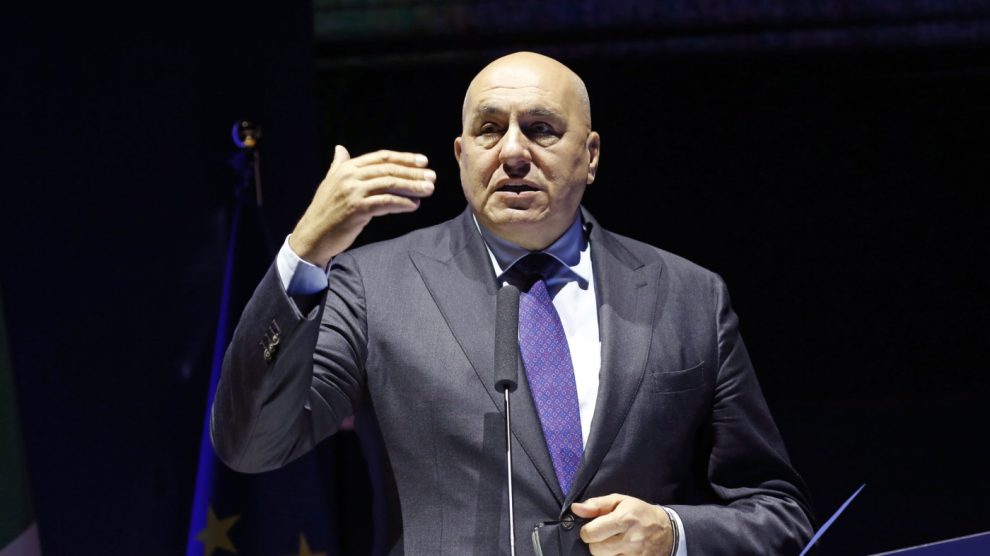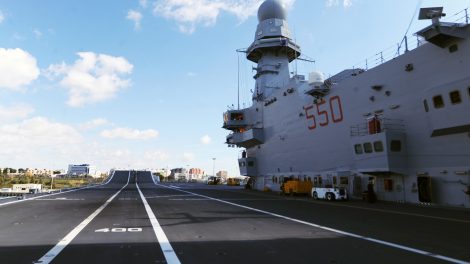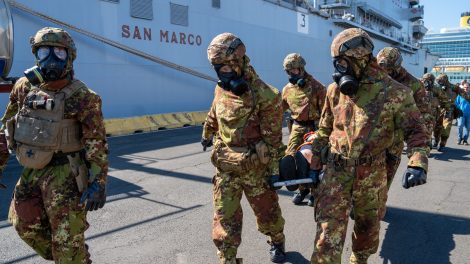Guido Crosetto’s all-encompassing talk. On Thursday, the Italian Defence Minister participated in the “Europe of Defence” panel at the Festival of Economics, currently underway in Trento. The occasion provided him with a platform to project what effectively amounts to Rome’s strategic vision on the most crucial dossiers worldwide. We broke it down thematically.
On Ukraine and the peace process. There is only one goal: to restore peace and stability to the European continent and to enlarge it. That’s the rationale behind supporting Ukraine, stressed Mr Crosetto. He also addressed protesters, who showed up outside the hall in Trento waving peace flags: “Give me one, and I will gladly wave it [too].”
- The point, he remarked, is that the political scenario appears immutable for the time being, although that might change. Meanwhile, “we have to reach the end of the conflict and seek a peace table, but someone has to stop throwing bombs.”
- The Italian minister also noted he had given his availability to Cardinal Matteo Zuppi, tasked by Pope Francis with the Holy See’s peace mission in Ukraine.
- He said Italy has an extra burden of responsibility towards the conflict, as it has “a different approach from almost all other nations in the world,” resting on its robust capacity for dialogue with other nations.
On European shared defence. No European nation is able to defend itself alone, remarked the minister, noting that Italian Defence (along with its allies) is “working on” the bureaucracy of creating a collective mechanism at the European level – that is, “bringing together the Armed Forces of all 27 countries so that they can work together […] like NATO.”
- The times are catalysing this kind of reasoning, added Minister Crosetto. “If you go to Poland, 90% of Poles are afraid of a real invasion,” he stressed, noting a degree of “resistance” to the concept of shared European defence.
On Africa… “Anyone who looks to the future must understand now that the only way to have a future in Europe is to create the conditions for a future in Africa,” highlighted the minister; “this is the concept we are trying to explain to Europe, NATO and the West.” The right approach, he stressed, is to stop “going to Africa to take without leaving anything” and instead “having respect and helping out.”
- He then pointed to Angola, with which Italy had just expanded cooperation across the energy, agri-food and mining sectors, noting the country hosts 15% of the world’s water and great agricultural possibilities “but needs labour, refrigerators to store products, a port to export, the factory where the raw material is processed, an industrial chain.” That’s where the West must come in, he stressed.
… and critical raw materials. Rare earth deposits – key materials underpinning the ecological and digital transitions – are the reason why Africa will be the next international battleground. “Their extraction produces a quantity of pollution that no Western country can bear. By now, not even China can sustain it, and it is moving to Africa,” noted Minister Crosetto, who believes this will lead to heavy clashes over huge interests between China and the United States.
- “Control of those materials will mean having control of the technological future of the world,” he stressed, expressing concern for “the short-sightedness of Italy and Europe regarding the future of raw materials” and adding that we must “start planting trees knowing that we will not enjoy their shade.”
On Italian defence in the world. “International peacekeeping missions have contributed to the confidence of citizens in [Italy’s] Armed Forces. It is so in Serbia and Kosovo, or Lebanon, as well as in the 44 international missions,” explained the minister. “When it is necessary to defend the homeland, we have selected people who should be prepared to die for us. This is an idea we have dismissed; it horrifies us […] However, this must make us think about how much we put democracy and freedoms on the scales.”
On the need to discuss defence. The key issue, according to the minister, is comparing the strength of democracies and autocracies. “Is a State that goes to elections and changes its government and political line stronger, or a nation ruled by one man? This is the challenge and the drama that these times present us with. It is an open challenge to all democracies, and Ukraine is the tip of the iceberg, perhaps only the beginning.”
- “I don’t know whether the democracies are able to respond to this challenge; I don’t know how the Western world can deal with such a difficult time,” he remarked, arguing that the Ukrainians’ fierce resistance “would be unthinkable” in richer Western nations.
- Nevertheless, he concluded, “we must ask ourselves how to face this cultural challenge in the coming years. It is ugly to talk about it; it is annoying, heavy, and difficult, but not to do so would be unacceptable.”




